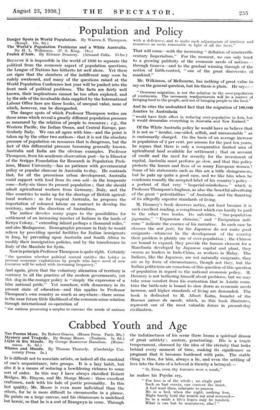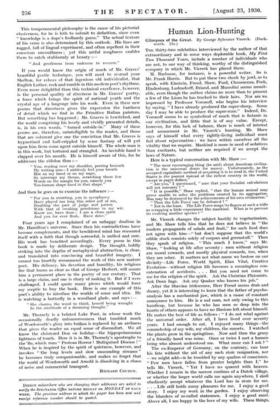Crabbed Youth and Age
Whims and Moods. By Thomas Thornely. (Cambridge Uni- versity Press. 5s.) IT is difficult not to associate artists, or indeed all the mankind of one's acquaintance, into groups. It is a lazy habit, but also it is a means of reducing a bewildering richness to some sort of order. In this way I have always claSsified Robert Bridges, Mr. Binyon, and Mr. Sturge Moore : three excellent craftsmen, each with his lode of poetic personality. In this last quality, Mr. Moore is even more individual than the others, for he is more difficult to circumscribe in a phrase. He paints on a large canvas, and his chiaroscuro is undefined but heroic, so that he is a sort of Brangwyn in verse. Through
the indistinctness of his scene there looms a spiritual drama of great subtlety ; austere, penetrating. His is a tragic temperament, obsessed by the idea of the eternity that lurks behind every moment of time, making its significance so pregnant that it becomes burdened with pain. The stable thing is thus, for him, always a lie, and even the settling of love into the form of a beloved is thereby a betrayal:—
" 0, Eros, even thy features were a mask,"
he makes his Psyche cry,
" For love is of the whole ; no single part Such as lust covets, can content the heart. A fool west thou, infatuate to possess
Ma in a bed, when the night, nothing lees, Might barely hold the wealth my soul resumed— So in a smile a life's hopes may be Combed. What is can but be monument, alas "
This temperamental philosophy is the cause of his pictorial elusiveness, for he is loth to submit to definition, since even " knowledge is a dupe's foolhardy guess." The actual texture of his verse is also determined by this outlook. His lines are rugged, full of lingual experiment, and often repellent in their conscious uncouthness ; yet this artful roughness enables them to catch stubbornly at beauty :-
" And gentleness from rudeness to recover."
If you would know the origin of much of Mr. Graves' beautiful poetic technique, you will need to re-read your Skelton, for echoes of that ingenious old individualist, that English Luther, rock and rumble in this modem poet's rhythms. Even more delightful than this technical excellence, however, is the personal quality of directness in Mr. Graves' poetry, a force which brings the spirit of national youth and the crystal age of a language into his work: Even in these new poems that directness gives the expression the hardness of detail which we find in the Primitive Italian painters. But something has happened ; Mr. Graves is bewitched, and the world comprising his lovely and vividly presented details, is, in his own words, " turned outside-in." Many of these poems are, therefore, unintelligible to the reader, and those that are coherent give one the conviction that Mr. Graves is hypnotized and half-crippled by some fantasy of will put upon him from some agent outside himself. The whole man is in this work, but tortured and strangled. An invisible hand is clapped over his mouth. He is himself aware of this, for he addresses the cidolon thus :— "You, reading over my shoulder, peering beneath My writing arm—I suddenly feel your breath Hot on my hand or on my nape,
So interrupt my theme, scratching these few Words on the margin for you, namely you Too-human shape fixed in that shape."
And then he goes on to exorcize the influence :-
" For you in strutting, you in sycophancy Have played too long this other self of me, Doubling the part of judge and patron With that of creaking grindstone to my wit. Know me, have done : I am a clean spirit And you for ever flesh. Have done."
Four years ago I complained of an unhappy dualism in Mr. Hamilton's universe. Since then his contradictions have become complements, and the bewildered mind has reassured itself with a faith that though sorrowful, is unified and sure. His work has benefited accordingly. Every poem in this book is made by deliberate design. The thought, boldly striking into the depths of metaphysical abstraction, is clear, and translated into convincing and beautiful imagery. I cannot too heartily recommend the work of this now mature poet. His delicacy, his devotion and humility, his religious lire that burns as clear as that of George Herbert, will assure him a permanent place in the poetry of our century. That is a large claim, and one is chary of making it. But if I were challenged, I could quote many pieces which would force my sceptic to buy the book. Here is one example of this poet's ability to interfuse the worlds of sense and idea. He is watching a butterfly in a woodland glade, and says :- " She charms the wood to think, herself being wrought In the similitude of a dreaming thought."
Mr. Thornely is a belated Lake Poet, in whose work the occasionally deadly unhumorousness that tumbled much of Wordsworth's glory into bathos is replaced by an archness that gives the reader an equal sense of discomfort. We all know the cloistered Don on holiday—the hippopotamusian lightness of touch. Here it is in Mr. Thornely's apostrophe to the 'flu, which runs " Protean Horror ! Multiguised Disease ! " When he is inspired by the spirit of quietness, however, and invokes " the long levels and slow unsounding streams " he becomes truly companionable, and makes us forget that the world of Wordsworth and Arnold is dissolving in a chaos of noise and commercial transport.
RICIIARE CHURCH.

































 Previous page
Previous page